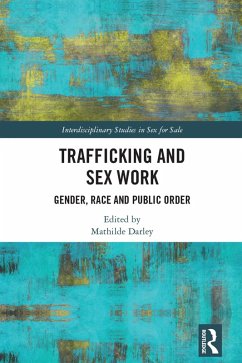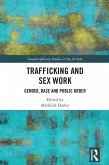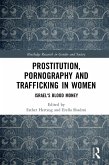Trafficking and Sex Work (eBook, PDF)
Gender, Race and Public Order
Redaktion: Darley, Mathilde
37,95 €
37,95 €
inkl. MwSt.
Sofort per Download lieferbar

19 °P sammeln
37,95 €
Als Download kaufen

37,95 €
inkl. MwSt.
Sofort per Download lieferbar

19 °P sammeln
Jetzt verschenken
Alle Infos zum eBook verschenken
37,95 €
inkl. MwSt.
Sofort per Download lieferbar
Alle Infos zum eBook verschenken

19 °P sammeln
Trafficking and Sex Work (eBook, PDF)
Gender, Race and Public Order
Redaktion: Darley, Mathilde
- Format: PDF
- Merkliste
- Auf die Merkliste
- Bewerten Bewerten
- Teilen
- Produkt teilen
- Produkterinnerung
- Produkterinnerung

Bitte loggen Sie sich zunächst in Ihr Kundenkonto ein oder registrieren Sie sich bei
bücher.de, um das eBook-Abo tolino select nutzen zu können.
Hier können Sie sich einloggen
Hier können Sie sich einloggen
Sie sind bereits eingeloggt. Klicken Sie auf 2. tolino select Abo, um fortzufahren.

Bitte loggen Sie sich zunächst in Ihr Kundenkonto ein oder registrieren Sie sich bei bücher.de, um das eBook-Abo tolino select nutzen zu können.
Set in different national contexts (Brazil, Bulgaria, France, Germany, Laos, Norway, Thailand) and in different social science disciplines, the chapters of this volume aim at questioning anti-trafficking policies and their practical impact on sex work regulation.
- Geräte: PC
- ohne Kopierschutz
- eBook Hilfe
- Größe: 2.46MB
Andere Kunden interessierten sich auch für
![Trafficking and Sex Work (eBook, ePUB) Trafficking and Sex Work (eBook, ePUB)]() Trafficking and Sex Work (eBook, ePUB)37,95 €
Trafficking and Sex Work (eBook, ePUB)37,95 €![Prostitution, Pornography and Trafficking in Women (eBook, PDF) Prostitution, Pornography and Trafficking in Women (eBook, PDF)]() Prostitution, Pornography and Trafficking in Women (eBook, PDF)43,95 €
Prostitution, Pornography and Trafficking in Women (eBook, PDF)43,95 €![Paying for Sex in a Digital Age (eBook, PDF) Paying for Sex in a Digital Age (eBook, PDF)]() Teela SandersPaying for Sex in a Digital Age (eBook, PDF)41,95 €
Teela SandersPaying for Sex in a Digital Age (eBook, PDF)41,95 €![Towards a Southern Approach to Sex Work (eBook, PDF) Towards a Southern Approach to Sex Work (eBook, PDF)]() Habiba SultanaTowards a Southern Approach to Sex Work (eBook, PDF)43,95 €
Habiba SultanaTowards a Southern Approach to Sex Work (eBook, PDF)43,95 €![Border Policing and Security Technologies (eBook, PDF) Border Policing and Security Technologies (eBook, PDF)]() Sanja MilivojevicBorder Policing and Security Technologies (eBook, PDF)42,95 €
Sanja MilivojevicBorder Policing and Security Technologies (eBook, PDF)42,95 €![Nigerian and Ghanaian Women Working in the Brussels Red-Light District (eBook, PDF) Nigerian and Ghanaian Women Working in the Brussels Red-Light District (eBook, PDF)]() Sarah AdeyinkaNigerian and Ghanaian Women Working in the Brussels Red-Light District (eBook, PDF)23,95 €
Sarah AdeyinkaNigerian and Ghanaian Women Working in the Brussels Red-Light District (eBook, PDF)23,95 €![The Routledge Handbook of Philosophy of Sex and Sexuality (eBook, PDF) The Routledge Handbook of Philosophy of Sex and Sexuality (eBook, PDF)]() The Routledge Handbook of Philosophy of Sex and Sexuality (eBook, PDF)46,95 €
The Routledge Handbook of Philosophy of Sex and Sexuality (eBook, PDF)46,95 €-
-
-
Set in different national contexts (Brazil, Bulgaria, France, Germany, Laos, Norway, Thailand) and in different social science disciplines, the chapters of this volume aim at questioning anti-trafficking policies and their practical impact on sex work regulation.
Dieser Download kann aus rechtlichen Gründen nur mit Rechnungsadresse in A, B, BG, CY, CZ, D, DK, EW, E, FIN, F, GR, HR, H, IRL, I, LT, L, LR, M, NL, PL, P, R, S, SLO, SK ausgeliefert werden.
Produktdetails
- Produktdetails
- Verlag: Taylor & Francis eBooks
- Seitenzahl: 294
- Erscheinungstermin: 30. Dezember 2022
- Englisch
- ISBN-13: 9781000826807
- Artikelnr.: 66432290
- Verlag: Taylor & Francis eBooks
- Seitenzahl: 294
- Erscheinungstermin: 30. Dezember 2022
- Englisch
- ISBN-13: 9781000826807
- Artikelnr.: 66432290
- Herstellerkennzeichnung Die Herstellerinformationen sind derzeit nicht verfügbar.
Mathilde Darley is a CNRS researcher at the CESDIP (Centre for Sociological Research on Law and Criminal Justice, France). Her research works deal with border control, migrants' detention, police work, gender, prostitution, and human trafficking. Together with Rebecca Pates (University of Leipzig, Germany), she coordinated the ANR-DFG research project ProsCrim on trafficking in human beings in France and Germany from 2014 to 2018 (ANR-13-FRAL-0014-01). Her recent publications include "Policing and Gender in France" (with J. Gauthier, 2021); "Caring for Victims of Human Trafficking: Staging and Bridging Cultural Differences in Germany and France" (with A. Dölemeyer, 2020); "Sexe, droit et migrations. La traite des êtres humains saisie par les institutions" (2021).
Introduction
PART I: Making Trafficking Come True: Counting, Expertising, and Classifying
1 How to Establish the Reality of Trafficking in Women? The Selective Disqualification of Sources by the Special Body of Experts of the League of Nations (1924-1927)
2 Sex Trafficking and "Reality Tourism" in Thailand: New Experts
3 From Social Experience to Cultural Expertise: the Role of Nonprofit Organizations in Identifying Sex Trafficking Victims in France
4 Negotiating the Territories of Anti-Trafficking Efforts: the "Unlikely Cooperation" Between Police Officers and Social Workers in Germany
5 "There's No Place Like Home": "Return Policies" for Human Trafficking Victims in Bulgaria
6 Assessing Damages for Sexual Exploitation: the Compensation of Trafficking Victims in France
PART II: For the Sake of the Victims: Criminalizing Sex Work, Gendering Public Order
7 French Abolitionism: From Eradicating Regulationism to Promoting Social Care
8 What Sex Workers Think About Victimhood, Violence, and Exploitation: Insights From a Collaborative Study Prioritizing Sex Workers' Voices
9 Gender Violence and Violence Against Sex Workers: Irreconcilable Perspectives
10 Policing Sex Work, Producing Gender: Gendered Division of Labor and Management of Sexual Illegalisms
11 Pimps on Trial
PART III: Think Globally, Act Locally: Anti-Trafficking Policies, From Universal Humanitarian Discourse to National Border Controls
12 Migration and Security: The Danger of Anti-Trafficking Heritage in Brazil
13 Fighting Human Trafficking Away From a Human Rights Frame: the Effects of Anti-Trafficking Regimes in Brazil
14 Trafficking Prevention for Workforce Retention Categorizing "Women at Risk" in Laos
15 Red Lights for Prostitution: Policing the Purchase of Sex in Norway
16 Judging Sexual Exploitation: a "Cultural" Crime?
PART I: Making Trafficking Come True: Counting, Expertising, and Classifying
1 How to Establish the Reality of Trafficking in Women? The Selective Disqualification of Sources by the Special Body of Experts of the League of Nations (1924-1927)
2 Sex Trafficking and "Reality Tourism" in Thailand: New Experts
3 From Social Experience to Cultural Expertise: the Role of Nonprofit Organizations in Identifying Sex Trafficking Victims in France
4 Negotiating the Territories of Anti-Trafficking Efforts: the "Unlikely Cooperation" Between Police Officers and Social Workers in Germany
5 "There's No Place Like Home": "Return Policies" for Human Trafficking Victims in Bulgaria
6 Assessing Damages for Sexual Exploitation: the Compensation of Trafficking Victims in France
PART II: For the Sake of the Victims: Criminalizing Sex Work, Gendering Public Order
7 French Abolitionism: From Eradicating Regulationism to Promoting Social Care
8 What Sex Workers Think About Victimhood, Violence, and Exploitation: Insights From a Collaborative Study Prioritizing Sex Workers' Voices
9 Gender Violence and Violence Against Sex Workers: Irreconcilable Perspectives
10 Policing Sex Work, Producing Gender: Gendered Division of Labor and Management of Sexual Illegalisms
11 Pimps on Trial
PART III: Think Globally, Act Locally: Anti-Trafficking Policies, From Universal Humanitarian Discourse to National Border Controls
12 Migration and Security: The Danger of Anti-Trafficking Heritage in Brazil
13 Fighting Human Trafficking Away From a Human Rights Frame: the Effects of Anti-Trafficking Regimes in Brazil
14 Trafficking Prevention for Workforce Retention Categorizing "Women at Risk" in Laos
15 Red Lights for Prostitution: Policing the Purchase of Sex in Norway
16 Judging Sexual Exploitation: a "Cultural" Crime?
Introduction
PART I: Making Trafficking Come True: Counting, Expertising, and Classifying
1 How to Establish the Reality of Trafficking in Women? The Selective Disqualification of Sources by the Special Body of Experts of the League of Nations (1924-1927)
2 Sex Trafficking and "Reality Tourism" in Thailand: New Experts
3 From Social Experience to Cultural Expertise: the Role of Nonprofit Organizations in Identifying Sex Trafficking Victims in France
4 Negotiating the Territories of Anti-Trafficking Efforts: the "Unlikely Cooperation" Between Police Officers and Social Workers in Germany
5 "There's No Place Like Home": "Return Policies" for Human Trafficking Victims in Bulgaria
6 Assessing Damages for Sexual Exploitation: the Compensation of Trafficking Victims in France
PART II: For the Sake of the Victims: Criminalizing Sex Work, Gendering Public Order
7 French Abolitionism: From Eradicating Regulationism to Promoting Social Care
8 What Sex Workers Think About Victimhood, Violence, and Exploitation: Insights From a Collaborative Study Prioritizing Sex Workers' Voices
9 Gender Violence and Violence Against Sex Workers: Irreconcilable Perspectives
10 Policing Sex Work, Producing Gender: Gendered Division of Labor and Management of Sexual Illegalisms
11 Pimps on Trial
PART III: Think Globally, Act Locally: Anti-Trafficking Policies, From Universal Humanitarian Discourse to National Border Controls
12 Migration and Security: The Danger of Anti-Trafficking Heritage in Brazil
13 Fighting Human Trafficking Away From a Human Rights Frame: the Effects of Anti-Trafficking Regimes in Brazil
14 Trafficking Prevention for Workforce Retention Categorizing "Women at Risk" in Laos
15 Red Lights for Prostitution: Policing the Purchase of Sex in Norway
16 Judging Sexual Exploitation: a "Cultural" Crime?
PART I: Making Trafficking Come True: Counting, Expertising, and Classifying
1 How to Establish the Reality of Trafficking in Women? The Selective Disqualification of Sources by the Special Body of Experts of the League of Nations (1924-1927)
2 Sex Trafficking and "Reality Tourism" in Thailand: New Experts
3 From Social Experience to Cultural Expertise: the Role of Nonprofit Organizations in Identifying Sex Trafficking Victims in France
4 Negotiating the Territories of Anti-Trafficking Efforts: the "Unlikely Cooperation" Between Police Officers and Social Workers in Germany
5 "There's No Place Like Home": "Return Policies" for Human Trafficking Victims in Bulgaria
6 Assessing Damages for Sexual Exploitation: the Compensation of Trafficking Victims in France
PART II: For the Sake of the Victims: Criminalizing Sex Work, Gendering Public Order
7 French Abolitionism: From Eradicating Regulationism to Promoting Social Care
8 What Sex Workers Think About Victimhood, Violence, and Exploitation: Insights From a Collaborative Study Prioritizing Sex Workers' Voices
9 Gender Violence and Violence Against Sex Workers: Irreconcilable Perspectives
10 Policing Sex Work, Producing Gender: Gendered Division of Labor and Management of Sexual Illegalisms
11 Pimps on Trial
PART III: Think Globally, Act Locally: Anti-Trafficking Policies, From Universal Humanitarian Discourse to National Border Controls
12 Migration and Security: The Danger of Anti-Trafficking Heritage in Brazil
13 Fighting Human Trafficking Away From a Human Rights Frame: the Effects of Anti-Trafficking Regimes in Brazil
14 Trafficking Prevention for Workforce Retention Categorizing "Women at Risk" in Laos
15 Red Lights for Prostitution: Policing the Purchase of Sex in Norway
16 Judging Sexual Exploitation: a "Cultural" Crime?







